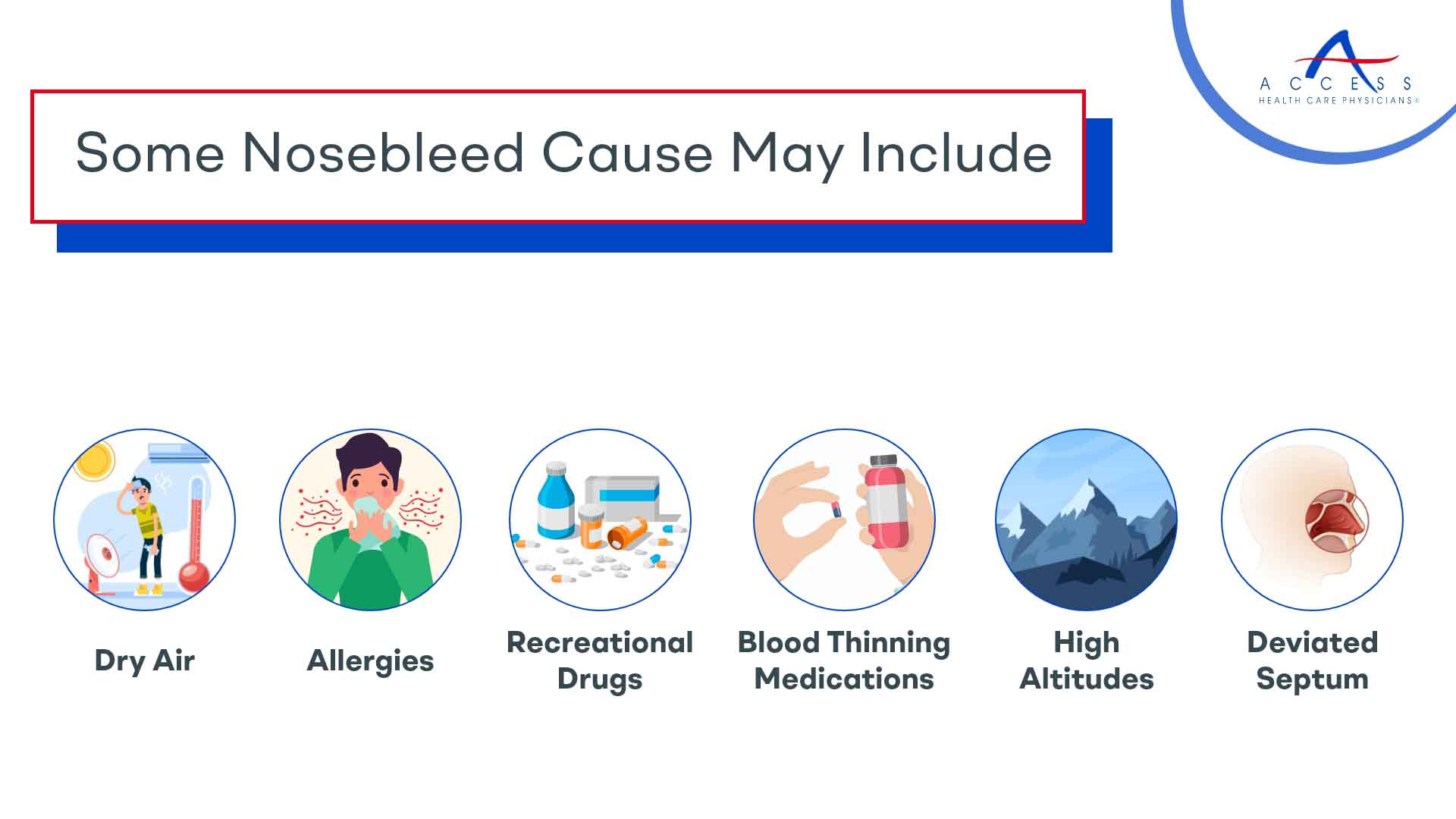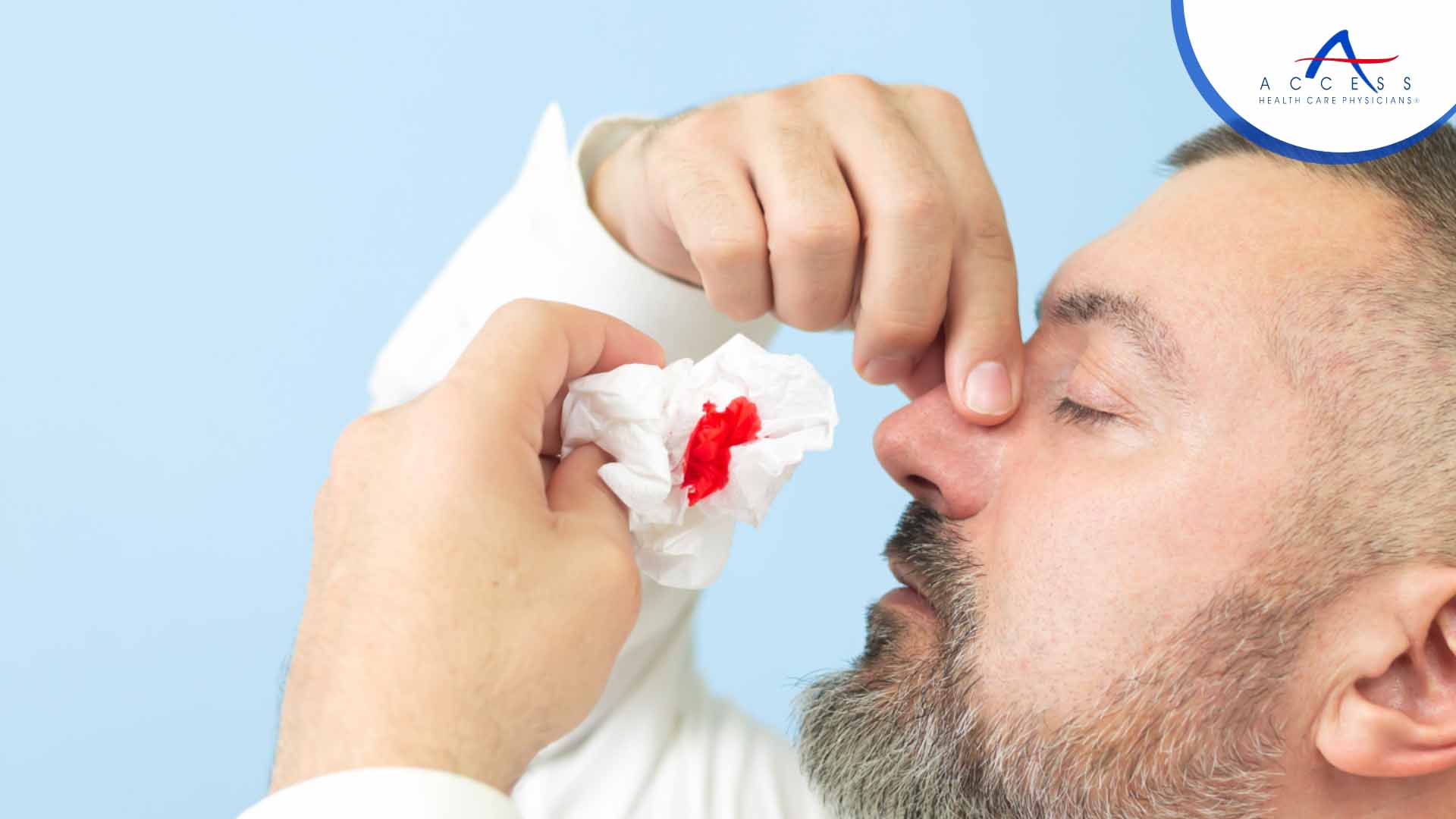Nosebleeds, medically known as epistaxis, are a common occurrence that can be alarming and often leads to concerns about underlying health issues. While nosebleeds can vary in severity, they are typically harmless and can be managed effectively.
Understanding Nosebleeds
Epistaxis, or a nosebleed, is when you lose blood from the tissue that lines the inside of your nose. Nosebleeds are frequently caused by a combination of dry air and microscopic blood veins that line the inner surface of your nose.
They occur when blood vessels within the nasal passages rupture, resulting in bleeding from the nose. The nose is rich in microscopic blood vessels that help warm and moisten the air you breathe. However, they are susceptible to drying out. It is advisable to keep your family doctor informed during such occurrences.
Nosebleeds can be categorized into two types: anterior nosebleeds and posterior nosebleeds.
Types of Nosebleeds
1. Anterior Nosebleeds
The most common type of nosebleed is anterior nosebleed, which involves bleeding from the front of the nose. They are caused by the rupture of blood vessels in the nasal septum, the thin wall that separates the nostrils.
Anterior nosebleeds are normally easily controllable and seldom result in serious consequences.
2. Posterior Nosebleeds
These are not as common but more concerning. They emerge from the back of the nose and are composed of bigger blood veins. Posterior nosebleeds usually require medical treatment as they may indicate an underlying medical issue.
How common are nosebleeds?
Epistaxis, or nosebleeds. are rather prevalent. Approximately 60% of people will experience at least one nosebleed during their lifetime. However, only around 10% of instances are serious enough to warrant medical attention.
While anyone can get it, there are some people more prone to it than others -
- Children between the ages of two and ten are more likely to have nosebleeds due to dry air, colds, allergies, and sticking fingers and random items into their noses.
- Blood can take longer to clot in adults aged 45 to 80 years old. These folks are also more prone to have hypertension, atherosclerosis (hardening of the artery walls), or a bleeding condition.
- Pregnant women: While pregnant, blood vessels in your nose grow, putting extra strain on the delicate blood vessels in the lining of your nose.
- People that take blood-thinning medications and those suffering from blood clotting issues, such as hemophilia.
What are the symptoms of a nosebleed?
- Bleeding from either or both nostrils
- A sensation of flowing liquid at the back of the throat - this is a sign of Posterior Nosebleeds
- The urge to swallow frequently
If you are experiencing any additional symptoms, this could be a sign of a medical problem.
What Causes a Nosebleed?

A variety of factors may lead to the onset of nosebleeds. Understanding these reasons can help people detect potential triggers and take necessary precautions:
- Dry Air: Dry air is one of the primary causes of nosebleeds, especially in low humidity and warm indoor conditions. This can dry up your nasal membrane (the fragile tissue inside your nose). Dry air can irritate the nasal passages, causing blood vessels to rupture.
- Nasal Trauma: Nosebleeds can be caused by an accidental injury to the nose, such as a blow to the face or nose-picking. Damage to the delicate blood vessels within the nasal cavity results in bleeding. You may also experience epistaxis after inserting an object in your nose. This is a common cause among children.
- Infections and Allergies: Upper respiratory infections, sinusitis, and allergies can irritate and inflame the nasal passages, increasing the likelihood of nosebleeds.
- Medications: Anticoagulants (blood thinners) and nonsteroidal anti-inflammatory drugs (NSAIDs) can interfere with blood coagulation and increase the probability of nosebleeds.
- Underlying Health Conditions: Recurrent or severe nosebleeds can be caused by a variety of medical conditions, including hypertension (high blood pressure), blood clotting issues, and nasal tumors. These cases require more examination and medical intervention.
How to Help Prevent Nosebleeds?
While nosebleeds might happen unexpectedly, there are various preventive actions people can take to reduce the frequency of them.
- Humidify the air: Using a humidifier at home or in dry places can help keep nasal passages wet and reduce the likelihood of nosebleeds.
- Nasal saline sprays: Using saline nasal sprays or rinses regularly helps to maintain the nasal passages moisturized and avoids dryness.
- Avoid nose picking: Refraining from picking or blowing the nose forcefully can reduce the risk of nasal trauma and subsequent nosebleeds.
- Stay hydrated: Drinking enough of water throughout the day can help keep you hydrated and prevent nasal dryness. Hydration is key.
- Protect Your nose: When participating in activities that may result in nose injuries, such as contact sports, it is essential to use suitable safety equipment, such as helmets and masks.
How do you stop a nosebleed?
Most of the time, you may not even require medical assistance. There is no need to panic, you can simply follow these easy steps.
- Maintain calmness and keep breathing through your mouth. Panicking can cause it to bleed more
- Keep your nostrils pinched and closed for about 5-10 minutes.
- Tilt your head forward as this keeps the blood from going down your mouth
- Once the bleeding has stopped, avoid blowing your nose for 24 hours
Seeking Medical Attention
While in most cases you can stop a nosebleed on your own, if this issue persists, it is advisable to go visit your primary care doctor. As your general practitioner, they will be able to examine your condition and help you out with an effective medical solution.
Frequently Asked Questions
If your bleeding does not stop in 30 minutes or if it is very heavy, pouring down the back of your throat and out the front of your nose, you should seek immediate medical attention.
Infection, injury, dryness, and allergic reaction are all common nosebleed causes.
Pinching the nose! Applying pressure helps a significant amount.
Cold compresses are the most effective home treatment for nasal bleeding.
No, nosebleeds are not a symptom or result of high blood pressure.


